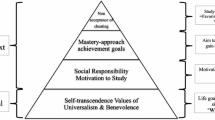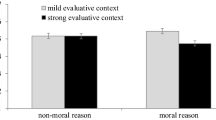Abstract
Peer reporting is a specific form of whistelblowing in which an individual discloses the wrongdoing of a peer. Previous studies have examined situational variables thought to influence a person's decision to report the wrongdoing of a peer. The present study looked at peer reporting from the individual level. Five hypotheses were developed concerning the relationships between (1) religiosity and ethical ideology, (2) ethical ideology and ethical judgments about peer reporting, and (3) ethical judgments and intentions to report peer wrongdoing.
Subjects read a vignette concerning academic cheating, and were asked to respond to a question-naire concerning the vignette. Data were analyzed using structural equation methodology.
Results indicated that religiosity was positively associated with an ethical ideology of non-relativism. Individuals whose ethical ideologies could be described as idealistic and non-relativistic were more likely to state that reporting a peer's cheating was ethical. In turn, individuals who believed reporting a peer's cheating was ethical were more likely to say that they would report a peer's cheating.
Similar content being viewed by others
References
Ajzen, I. and M. Fishbein: 1980, Understanding Attitudes and Predicting Social Behavior (Prentice-Hall, Inc., Englewood Cliffs, New Jersey).
Allport, G. W. and J. M. Ross: 1967, ‘Personal Religious Orientation and Prejudice’, Journal of Personality and Social Psychology 5, 432–443.
Bagozzi, R. P., and Y. Yi: 1988, ‘On the Evaluation of Structural Equation Models’, Journal of the Academy of Marketing Science 16(1), 74–94.
Barnett, T., K. Bass and G. Brown: 1994, ‘Ethical Ideology and Ethical Judgment Regarding Ethical Issues in Business’, Journal of Business Ethics 13, 469–480.
Barnett, T., D. S. Cochran and G. S. Taylor: 1993, ‘The Internal Disclosure Policies of Private-Sector Employers: An Initial Look at Their Relationship to Employee Whistleblowing’, Journal of Business Ethics 12, 127–136.
Brabeck, M.: 1984, ‘Ethical Characteristics of Whistleblowers’, Journal of Research in Personality 18, 41–53.
Brief, A. P. and S. J. Motowidlo: 1986, ‘Prosocial Organizational Behaviors’, Academy of Management Review 11, 710–725.
Christie, R. and F. L. Geis: 1970, Studies in Machiavellianism (Academic Press, New York).
Glary, E. Gil and M. Snyder: 1991, ‘A Functional Analysis of Altruism and Prosocial Behavior’ in M. S. Clark (ed.) Prosocial Behavior (Sage Publications, Newbury Park).
Cornwall, M., S. L. Albrecht, P. H. Cunningham and B. L. Pitcher: 1986, ‘The Dimensions of Religiosity: A Conceptual Model With An Empirical Test’, Review of Religious Research 27(3), 226–243.
Donahue, M. J.: 1985, ‘Intrinsic and Extrinsic Religiousness: Review and Meta-Analysis’, Journal of Personality and Social Psychology 48(2), 400–419.
Dozier, J. B. and M. P. Miceli: 1985, ‘Potential Predictors of Whistleblowing: A Prosocial Behavior Perspective’, Academy of Management Review 10, 823–836.
Dubinsky, A. J. and B. Loken: 1989, ‘Analyzing Ethical Decision Making in Marketing’, Journal of Business Research 19, 83–107.
Farrell, D. and J. C. Petersen: 1982, ‘Patterns of Political Behavior in Organizations’, Academy of Management Review 7, 403–412.
Forsyth, D. R.: 1985, ‘Individual Differences in Information Integration During Moral Judgment’, Journal of Personality and Social Psychology 49, 264–272.
Forsyth, D. R.: 1992, ‘Judging the Morality of Business Practices: The Influence of Personal Moral Philosophies’, Journal of Business Ethics 11, 461–470.
Forsyth, D. K.: 1981, ‘Moral Judgment: The Influence of Ethical Ideology’, Personality and Social Psychology Bulletin 7, 218–223.
Forsyth, D. R., J. L. Nye and K. Kelley: 1988, ‘Idealism, Relativism, and the Ethic of Caring’, The Journal of Psychology 112, 243–248.
Forsyth, D. R. and R. E. Berger: 1982, ‘The Effects of Ethical Ideology on Moral Behavior’, The Journal of Social Psychology 117, 53–56.
Forsyth, D. R.: 1980, ‘A Taxonomy of Ethical Ideologies’, Journal of Personality and Social Psychology 39, 175–184.
Forsyth, D. R. and J. L. Nye: 1990, ‘Personal Moral Philosophies and Moral Choice’, Journal of Research in Personality 24, 398–758.
Fritzsche, D. J. and H. Becker: 1984, ‘Linking Management Behavior to Ethical Philosophy — An Empirical Investigation’, Academy of Management Journal 27, 166–175.
Fullerton, J. T. and B. Hunsberger: 1982, ‘A Unidimensional Measure of Christian Orthodoxy’, Journal for the Scientific Study of Religion 21, 317–326.
Glock, C. Y. and R. Stark: 1965, Religion and Society in Tension (Rand McNally, Chicago).
Graham J. W.: 1983, Principled Organizational Dissent, Unpublished doctoral dissertation, Northwestern University.
Graham, J. W.: 1986, ‘Principled Organizational Dissent: A Theoretical Essay’, in B. M. Staw and L. L. Cummings (eds.), Research in Organizational Behavior, Vol. 8 (JAI Press Incorporated), pp. 1–52.
Greenberger, D. B., M. P. Miceli and D. J. Cohen: 1987, ‘Oppositionists and Group Norms: The Reciprocal Influence of Whistle-blowers and Coworkers’, Journal of Business Ethics 6, 527–542.
Hunt, S. D., and S. Vitell: 1986, ‘A General Theory of Marketing Ethics’, Journal of Macromarketing 6, 5–16.
Hunsberger, B.: 1989, ‘A Short Version of the Christian Orthodoxy Scale’, Journal for the Scientific Study of Religion 28(3), 360–365.
Jones, T. M.: 1991, ‘Ethical Decision Making by Individuals in Organizations: An Issue-Contingent Model’, Academy of Management Review 16, 366–395.
Keenan, J. P.: 1990, ‘Upper-level Managers and Whistleblowing: Determinants of Perceptions of Company Encouragement and Information About Where to Blow the Whistle’, Journal of Business and Psychology 5, 223–235.
Kirkpatrick, L. A.: 1993, ‘Fundamentalism, Christian Orthodoxy, and Intrinsic Religious Orientation as Predictors of Discriminatory Attitudes’, Journal of the Scientific Study of Religion 32(3), 256–268.
Kellstedt, L. and C. Smidt: 1991, ‘Measuring Fundamentalism: An Analysis of Different Operational Strategies’, Journal for the Scientific Study of Religion 30, 259–278.
Leary, M. R., P. D. Knight and B. D. Barnes: 1986, ‘Ethical Ideologies of the Machiavellian’, Personality and Social Psychology Bulletin 12(1), 75–80.
McDaniel, S. W. and J. J. Burnett: 1990, ‘Consumer Religiosity and Retail Store Evaluative Criteria’, Journal of the Academy of Marketing Science 18(2), 101–112.
McFarland, S. G.: 1989, ‘Religious Orientations and the Targets of Discrimination’, Journal for the Scientific Study of Religion 28(3), 324–336.
Miceli, M. P., J. B. Dozier and J. P. Near: 1991, ‘Blowing the Whistle on Data Fudging: A Controlled Field Experiment’, Journal of Applied Social Psychology 21, 271–295.
Miceli, M. P. and J. P. Near: 1992, Blowing the Whistle (Macmillan Publishing Company: Riverside, New Jersey).
Miceli, M. P. and J. P. Near: 1985, ‘Characteristics of Organizational Climate and Perceived Wrongdoing Associated with Whistleblowing Decision’, Personnel Psychology 38, 525–544.
Miceli, M. P., B. L. Roach and J. P. Near: 1988, ‘The Motivations of ‘Deep Throat’: The Case of Anonymous Whistle-Blowers’, Public Personnel Management 17, 281–296.
Near, J. P. and M. P. Miceli: 1987, ‘Whistle-blowers in Organizations: Dissidents or Reformers’, in B. M. Staw and L. L. Cummings (eds.), Research in Organizational Behavior, Vol. 9 (JAI Press Incorporated), pp. 321–368.
Near, J. P. and M. P. Miceli: 1985, ‘Organizational Dissidence: The Case of Whistle-Blowing’, Journal of Business Ethics 4, 1–16.
Perkins, H. W.: 1992, ‘Student Religiosity and Social Justice Concerns in England and the United States: Are They Still Related?’, Journal for the Scientific Study of Religion 31(3), 353–360.
Reidenbach, R. E., and D. P. Robin: 1990, ‘Toward the Development of a Multidimensional Scale for Improving Evaluations of Business Ethics’, Journal of Business Ethics 9, 639–653.
Reidenbach, R. E. and D. P. Robin: 1988, ‘Some Initial Steps Toward Improving the Measurement of Ethical Evaluations of Marketing Activities’, Journal of Business Ethics 7, 871–879.
Rest, J. R.: 1986, Moral Development: Advances in Research and Theory (Praeger, New York).
Richards, P. S. and M. L. Davison: 1992, ‘Religious Bias in Moral Development Research: A Psychometric Investigation’, Journal for the Scientific Study of Religion 31, 467–485.
Schlenker, B. M. and D. R. Forsyth: 1977, ‘On the Ethics of Psychological Research’, Journal of Experimental Social Psychology 13, 369–396.
Stead, W. E., D. L. Worrell and J. G. Stead: 1990, ‘An Integrative Model for Understanding and Managing Ethical behavior in Business Organizations’, Journal of Business Ethics 9, 233–242.
Trevino, L. K. and B. Victor: 1992, ‘Peer Reporting of Unethical Behavior: A Social Context Perspective’, Academy of Management Journal 35(1), 38–64.
Victor, B., L. K. Trevino and D. L. Shapiro: 1993, ‘Peer Reporting of Unethical Behavior: The Influence of Justice Evaluations and Social Context Factors’, Journal of Business Ethics 12, 253–263.
Wiebe, K. F. and J. R. Fleck: 1980, ‘Personality Correlates of Intrinsic, Extrinsic, and Nonreligious Orientations’, Journal of Psychology 105, 181–187.
Woodrum, E.: 1988, ‘Determinants of Moral Attitudes’, Journal for the Scientific Study of Religion 27, 253–573.
Author information
Authors and Affiliations
Additional information
Tim Barnett is Assistant Professor of Management at Louisiana Tech University. He has authored or coauthored articles appearing in Human Relations, Personnel Psychology, the Journal of Business Research, and the Journal of Business Ethics, among others. His current research interests include whistle-blowing and the ethical decision making process.
Ken Bass is Assistant Professor of Management at East Carolina University. He has published articles in journals including the Journal of Personal Selling and Sales Management and the Journal of Business Ethics. His research interests include ethical decision making, ethical strategy, and methodology.
Gene Brown is Professor of Marketing at Louisiana Tech University, and received the Ph.D. from the University of Alabama. He has published in a variety of journals including the Journal of Marketing Research, the Journal of Business Research, the Journal of Business Ethics, and the Journal of the Academy of Marketing Science. His research intersts include personal selling, retailing, ethics, and methodology.
Rights and permissions
About this article
Cite this article
Barnett, T., Bass, K. & Brown, G. Religiosity, ethical ideology, and intentions to report a peer's wrongdoing. J Bus Ethics 15, 1161–1174 (1996). https://doi.org/10.1007/BF00412815
Issue Date:
DOI: https://doi.org/10.1007/BF00412815




